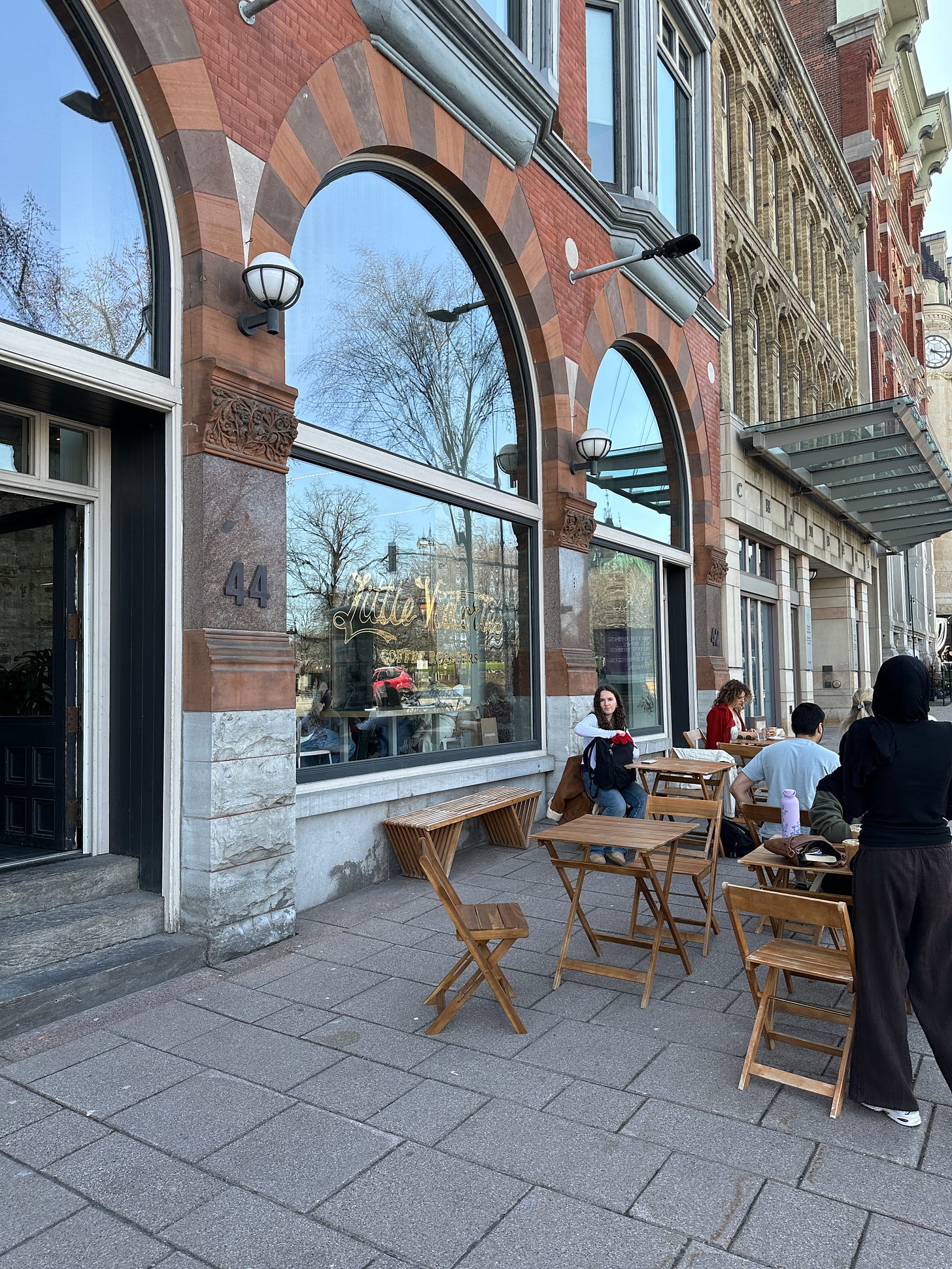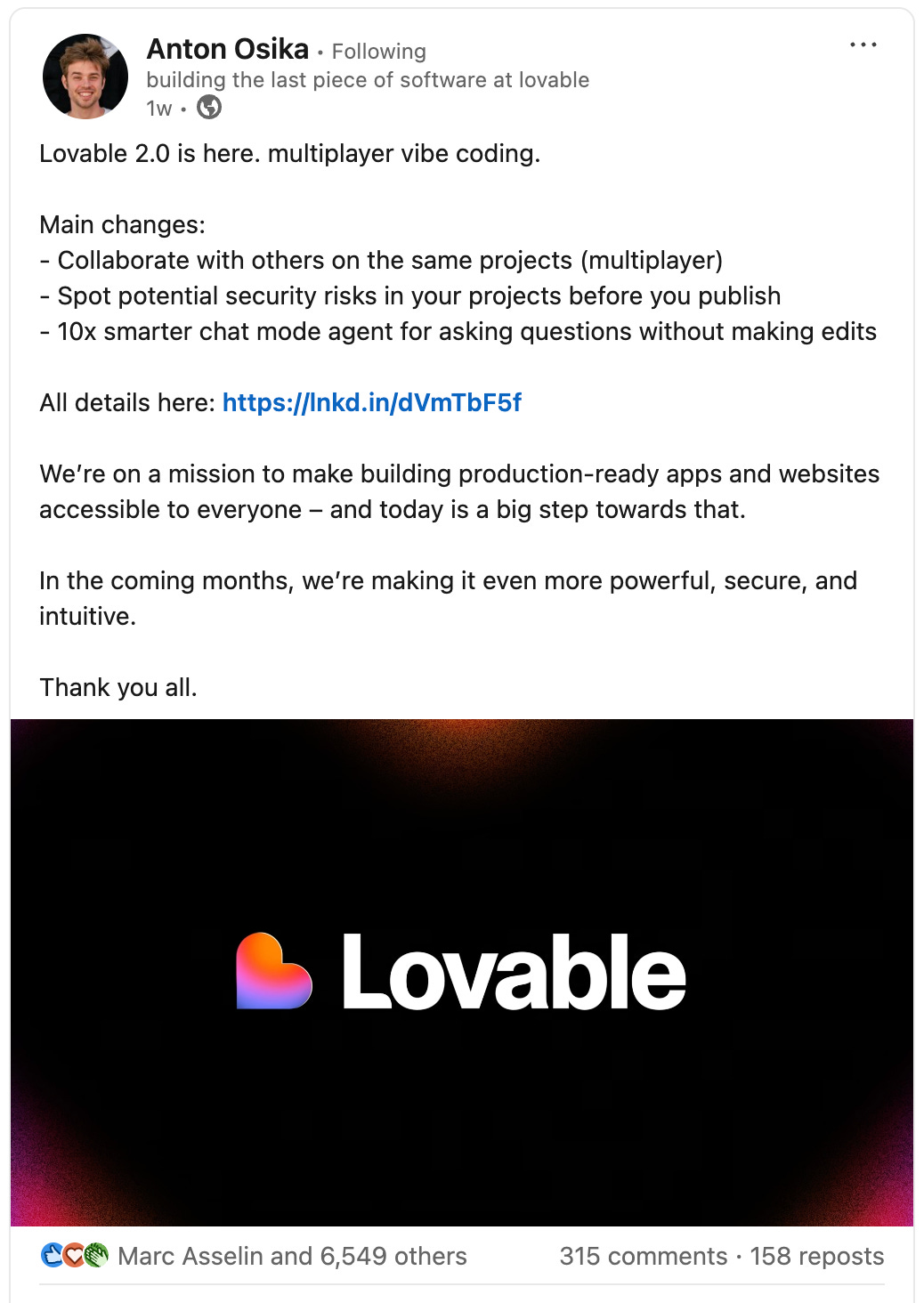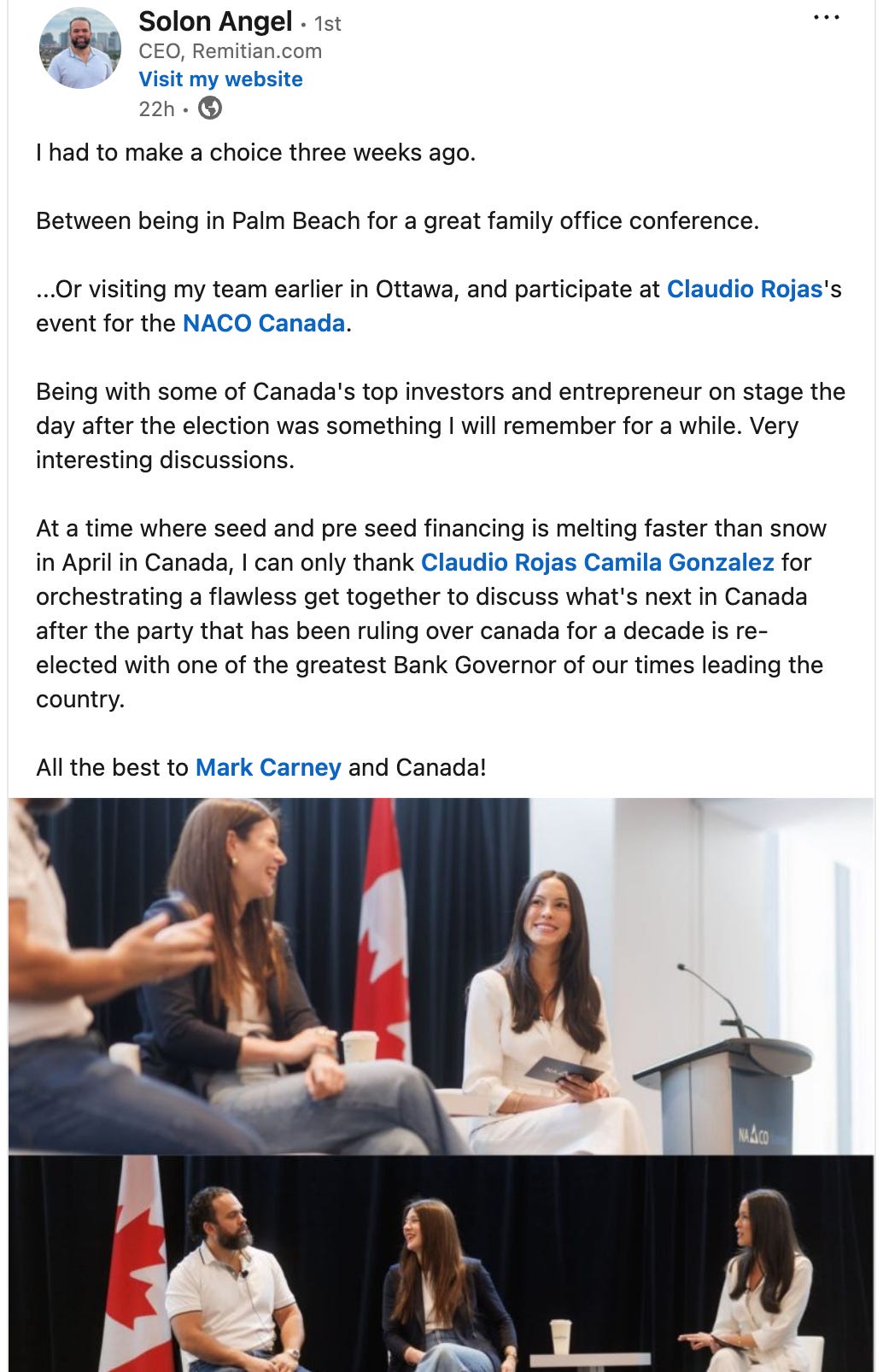50-50 Cafe Mergers / Anything is Possible
4 Takeaways from Ottawa

It’s a common theme on this newsletter - in this newsiverse - that the opposite of stuckness is makeness. That if you’re feeling bad about yourself, or anxious about your place in this big-small world, the antidote to that feeling is to make something. Ideally with other people - because that’s the only way that great things are made.
We underestimate what’s possible in a cafe. The world is possible in a coffeehouse because it’s a gathering place, and the world only happens when we gather. The universe is a verb.
“Startups operate on the principle that you need to work with other people to get stuff done, but you also need to stay small enough so that you actually can.” - Thiel
When PayPal released the core product in 1999, Elon was close behind with a platform called x.com (stranger than fiction). Both were headquartered on University Avenue in Palo Alto, California and by the end of that year they ‘…were in all-out war.’ So much so that the unending hours spent in the PayPal office were often focused more on defeating Elon than making PayPal better.
There was another looming threat beyond one another - fear of the tech bubble bursting and ruining the party for everyone - something that seemed like a real possibility when Elon and Peter met, in March 2000, at a cafe to negotiate the 50-50 merger of X and PayPal. The cafe was, as Peter says, ‘…almost equidistant to our offices…’ so it was a reasonable neutral ground on which to lay down their swords. A single-origin Switzerland of sorts. Caffeinated common-ground.
Anything is possible in a cafe.
I sit, writing to you now, again in Little Victories, having just come from the Byward Market. I had 7:00am espresso at Cafe Opulence with a friend - very Italian, although the proprietor appeared to be French. We had a quick chat before he went off to work, and I went to the French bistro around the corner for a croissant.
I made my way (slowly) back to Little Victories and by the time I arrived - nigh on 7:45am - the place was damn near full. Full of folks having a morning chat over coffee, working on their work, sitting quietly, reading a book, writing. The kind of place where you can come for revelation or relationship - take your pick.

For those of you who like to rank things (guilty), I would go to Equator in the National Arts Centre if all I cared for was quality. I would go to Little Victories to write and to meet a friend before work. I would go to Opulence if I only had 15 minutes to spare, and I would go to Moulin de Provence if I wanted something that included bread (croissant).
The National Arts Centre played host to the 2025 NACO Summit and that was where I found myself for the week. It being NACO there were many vests. So many vests. There were button up shirts, the odd suit and tie, and as many timex as rolex (mechanical is now an anti-status symbol). There was even a lady dressed as a fashionable Mountie! (a level of social confidence I could never dream of).
There is never revelation at a traditional conference, but it’s a good chance to make a good first impression. If I was to give fellow introverts a word of unsolicited advice - it would be go there with the intention of meeting 3-5 specific people, and to learn more about the place you find yourself in. If you can do that - money well spent.
The work of those of us at this particular conference - the work of building, investing in, and nurturing new companies - is the fundamentals business. There is nothing new under the sun. You may be able to combine principles in unique ways, and mold that unique combination into a process (that’s what we’ve done at Axis) but there isn’t anything new here.
What we do is about creativity, consistency, and working the fundamentals over a long period of time. That takes courage.
“…courage is in even shorter supply than genius.” - Thiel
The idea that we do any deep work on the road or at conference is as ludicrous as the idea that we can do all of our work alone, in our home office, on a computer screen. Both are silly notions. You do the vast majority of your deep work in the rhythm and flow of your average day, and then you go out into the world to build on that work and make relationships. Both are necessary. Both are important.
The theme of the summit - at it’s highest level - was early stage investment in startup companies. As someone at the conference said, if the founders of companies are plants, the soil is their network, team, and place, and angel investors are the water that helps them grow. We’re forgetting about sunlight in this growth equation - the thing that without we would not have photosynthesis at all. That’s customers. I prefer to think of customers as the water and the sunlight because the right customers influence product innovation and growth - but I’ll give him his flowers anyway (pun very much intended).
Business founders inspire me because they have earned insight into something in the world that doesn’t work quite right, they have the courage to build something and test it with their customers, and they have the wisdom to listen to what comes back and iterate. They make new things and it’s exciting to make new things.
“Of course, it’s easier to copy a model than to make something new. Doing what we already know how to do takes the world from 1 to n, adding more of something familiar. But every time we create something new, we go from 0 to 1. The act of creation is singular, as is the moment of creation, and the result is something fresh and strange.” - Thiel
Although I avoid the list genre as much as possible, this feels like a good a time as any. Here are my 4 key takeaways from the NACO 2025 Summit.
Please enjoy.
“Start.” - Sahil Lavingia
All we need is a point of view, a set of tools, and a lot of time.
I hope that in this post you learn about trends in early-stage investing, how investors behave, why startups need to maximize the opportunity (wherever it leads), and the role of accelerators in startup success.
Here are 5 Tools used in this post.
Peter Thiel’s Zero to One
The window seat at Little Victories - place is a very underrated tool
Lovable - the most impressive natural language builder I’ve used to date
Europe’s startup moment (finally)
Are you interested in getting access to all of the tools used in every post on People & Place? Let me know in the comments and I’ll build something new and interesting for this community.
Time to Exit (it’s longer now)
The good news is that, according to Claudio, early-stage investment in Canadian startups increased by 20% last year, YoY, even though average deal size went down by 8% (this may not actually matter that much?).
The latter may be because smaller teams can do more with less now. That’s probably good news right? Teams can retain more ownership, build and ship products faster and with less money. It’s incredible how fast you can build a reasonable V1 and get it in the customers hands. From there, it’s about velocity - speed in the right direction.
The not-so-good news is time to exit in Canada now seems to be in the 12-17 year range. How do we find our way to liquidity faster? In laymans terms - cash that both founders and investors are free to spend on other things (hopefully more early investments in the next generation).
Senia Rapisarda, Managing Director of HarbourVest, had some good thoughts about this on one of the final panels of Day 2. Harbour manages their portfolio by balancing the flippers and the unicorn builders. Of course they want founders who are on a mission to build big, successful, billion dollar companies. But they don’t ignore or push away the ‘flippers’ that have identified an interesting problem, can build something quickly to solve the problem, and want to sell in 3-5 years for a 2-5x return.
In the AI era, will time to exit come down because we can get to revenue so quickly?
Betting on Great Founders (the process)
This is the fundamentals business and the interesting thing about fundamentals is they survive across geography, and over time. Early stage investors still bet on great teams - people of high character and almost delusional belief - who have identified a great problem that’s getting bigger. There is a process - a way that this thing goes and investors want founders to come correct.
Team is 1A and 1B at the earliest stage because… ‘a small handful of companies radically outperform all others.’ Solon Angel made this clear in the opening panel - investors bet on a big opportunity, identified by someone with deep domain expertise, high character, common sense, and extreme belief.
Even though we don’t invest (yet) this is how we behave at the Axis Sales Accelerator. We bet on great teams and we work them through the strategic acquisition of Lead Growth Customers. In the S25 batch (launching in May), we have an AI focused founder team who were with a prior company through a $120M Series C. They don’t know exactly what they’re building yet, but we know they’re going to figure it out and so we want them figuring it out at Axis.
Investment readiness is something that many BAIs claim to do, but often investors meet founders that aren’t prepared to work the process. In the early days it means first principles stuff like a solid, professional approach, an open data room with relevant business information, and a short pitch that starts with the problem and ends with the opportunity ahead.
There’s a second half of the equation and that’s what happens after investment. Once you’ve taken on investment, the company becomes a different thing and you need to ensure that thing is prepared. Communication seems to be as fundamental to this dynamic as it is within any relationship. Governance matters at this stage.
Maximize the Opportunity (then reinvest)
I left many sessions feeling a sense of unity that I didn’t entirely expect. Even from our American brothers and sisters who were there (and I’m very pleased they were), reminding us all that administrations come and go, our economies are intimately linked, and that they remain steadfast in wanting North-American startups to succeed. Imagine the fundamental might (and goodness) of a truly united Canada-USA-Mexico?
The message the summit was clear - our job as founders, BAIs, and early stage investors is to maximize the opportunity. If that means that a Canadian startup sells to American or German customers, so be it. If that means Canadian founders raise in America or the EU, so be it. Maximize the opportunity - acquire meaningful customers in meaningful markets - and then reinvest in the Canadian ecosystem.
Many Canadian founders find early success raising in the States because they have the best early-stage risk capital on earth.
It would be foolish to ignore it. We need to be in the business of living in reality, balanced by the recognition that Canada has the chance to become a powerhouse, within it’s domains of excellence (energy anyone?).
Within the national ecosystem, we need to continue to lower barriers to trade and prosperity inter-provincially.
An example of this was the summit call for a national investor tax credit - blanket 30% with no inter-provincial hiring clauses. Obviously we have to figure out the details, but this would be a huge win for the deployment of more early-stage risk capital in the country.
Maximize the opportunity my fellow Canadians!
The Role of Accelerators (Sales & LGCs)
I was pleased to hear how much focus was placed on sales and revenue. Sales is as important as product.
“Creating value is not enough - you also need to capture some of the value you create.” - Thiel
At the Axis Sales Accelerator we believe that customers influence product innovation and growth, and that deep customer relationships ought to be developed and nurtured over time.
The cover image of this piece was the final panel I attended on Day 2, on the role of incubators and accelerators in startup success. The main attraction, rightfully so, will always be the founder. But we can do some things right to stack the deck in their favour and lower risk for founders and investors.
Side: If you want to learn more about our approach - DM me and we can hop on a quick discovery call.
Interestingly, but not surprisingly, the industry seems to be evolving rapidly - incubators are segmenting by industry, and accelerators are segmenting by function. Often founders (rather wisely) will access both strategically. You might join a process oriented sales accelerator, like ours, that focuses on founder led sales and acquiring those first lead growth customers, and then join an industry specific in-market incubator to develop customer relationships in a significant market opportunity. This is smart and should be encouraged (although program hopping - unless hyper useful - should not).
It’s up to us as service providers to get really good at a small number of things, and collaborate nationally and internationally on everything else. In that way we stay focused and communicate a specific value proposition to founders - maintaining the integrity and simple navigation of the entire ecosystem.
If we don’t, we risk over-servicing the market (are we already there?). For every service provider there - by definition - must be hundreds of ambitious founders.
“The paradox of teaching entrepreneurship is that such a formula necessarily cannot exist; because every innovation is new and unique, no authority can prescribe in concrete terms how to be innovative. Indeed, the single most powerful pattern I have noticed is that successful people find value in unexpected places, and they do this by thinking about business from first principles instead of formulas.” - Thiel
All we need is a point of view, a set of tools, and a lot of time.
See you on the road.
“Discovering breakthrough ideas is challenging, not because they’re hidden secrets, but because we’re conditioned to notice the familiar, while overlooking what might be.” - Mike Maples Jr.





